张培基讲得翻译理论
翻译的定义

翻译的定义1.翻译的定义1980年,我国著名翻译家张培基先生在《英汉翻译教程》一书的绪论中,从语言学的角度为翻译下了这样的定义:“翻译是运用一种语言把另一种语言所表达的思维内容准确而完整地重新表达出来的语言活动。
”冯庆华先生在《实用翻译教程》一书中则从语言学和文艺学的双重角度界定了翻译的本质:“翻译是许多语言活动中的一种,它是用一种语言形式把另一种语言形式里的内容重新表现出来的语言实践活动。
翻译是一门艺术,是语言艺术的再创作。
”2. 翻译的标准我国比较系统全面论述翻译标准的是清末著名翻译家严复,他在《天演论·译例言》(1898)中提出“信达雅”的翻译标准。
他说:译事三难,信、达、雅。
求其信,已大难矣。
顾信矣不达,虽译犹不译也,则达尚焉。
…………此在译者将全文神理,融会于心,则下笔抒词,自然互备。
至原文词理本深,难于共喻,则当前后引衬,以显其意。
凡此经营,皆以为达,为达即所以为信也。
易日:?修辞立诚?。
子曰:?辞达而已。
?又曰:?言之无文,行之不远?。
三者乃文章正轨,亦译事楷模,故信、达而外,求其尔雅。
……这三条标准对后世的翻译实践起了巨大的指导作用,一百多年来,中国译界虽然对它的褒贬一直未断,特别是对其中的“雅”字多有异议,因而试图提出一些新的说法,如林语堂提出“忠实、通顺、美”的标准,刘重德提出“信达切”的标准,许渊冲提出“信达优”的标准,但是,迄今为止,还没有哪一种说法能够替代“信达雅”,为大家所接受。
钱钟书先生于1964年在《林纾的翻译》一文中提出了翻译的“化境”说。
他说:文学翻译的最高标准是‘化’。
把作品从一国文字转变成另一国文字,既不能因语文习惯的差异而露出生硬牵强的痕迹,又能完全保存原有的风味,那就算得入于‘化境’。
十七世纪有人赞美这种造诣的翻译,比为原作的‘投胎转世’,躯壳换了一个,而精神姿致依然故我。
换句话说,译本对原作忠实得以至于读起来不像译本,因为作品在原文里决不会读起来像经过翻译似的。
英汉翻译教程张培基【完整版】

英汉翻译教程张培基【完整版】《英汉翻译教程》第一章总论翻译是运用一种语言把另一种语言所表达的思维内容准确完整地重新表达出来的语言活动。
(张培基等1983)我国早期典籍《周礼·秋官司寇》篇里就有―象胥‖(谓通言语之官)这一名目,唐朝贾公彦所作的《义疏》里提到―译即易,谓换易言语使相解也。
‖这条注疏,关于翻译的定义,足以给人不少启发。
用现代文艺理论和语言理论,也许可以诠释为:翻译是把一种语言文字换易成另一种语言文字,而并不变更所蕴含的意义,——或用近年流行的术语说,并不变更所传递的信息,——以达到彼此沟通,互相了解的目的。
(罗新璋1984)一、关于翻译何谓翻译?关于翻译的定义很多。
根据《现代汉语词典》,翻译是―把一种语言文字的意义用另一种语言文字表达出来‖。
根据《剑桥语言百科全书》,―翻译‖这个中性术语是指将一种语言(―原语‖)里的词句的意思转变为另一种语言(―目的语‖)的意思所做的一切,不论其手段是说话、写字还是做手势。
美国著名翻译理论家奈达认为,所谓翻译,是指从语义到语体在译语中用最切近而又最自然的对等语再现原语的信息。
(《奈达论翻译》,1984)有人把翻译看作是一门科学(science),因为它有自身的规律可循;有人看作是一门艺术(art),因为它是译者对原文再创造的过程;也有人看作是一门手艺(craft),因为原语的信息需要用地道恰当的目的语再现。
在自动化数据处理中,翻译又被定义为:―将计算机信息从一种语言转换成另一种语言,或将字符从一种表示转换成另一种表示。
‖(《现代科学技术词典》上海科学技术出版社1980)凡此种种,不一而足。
但是,在经济和文化日益全球化的今天,翻译的重要性是有目共睹的。
翻译是国际间理解的钥匙,据说西欧的文明归功于翻译者(据L·G·凯里1979)。
季羡林教授也说,翻译是永葆中华文明青春的万应灵药。
前中国驻联合国代表凌青先生说,从中国来讲,没有翻译工作,就没有中国***和中国近代的革命运动,就没有中国成功的对外开放和四个现代化;从世界范围来讲,没有翻译,就没有世界和平,就没有各种国际交往,就没有一个共同繁荣的美好世界的未来。
张培基的翻译思想及其译品赏析
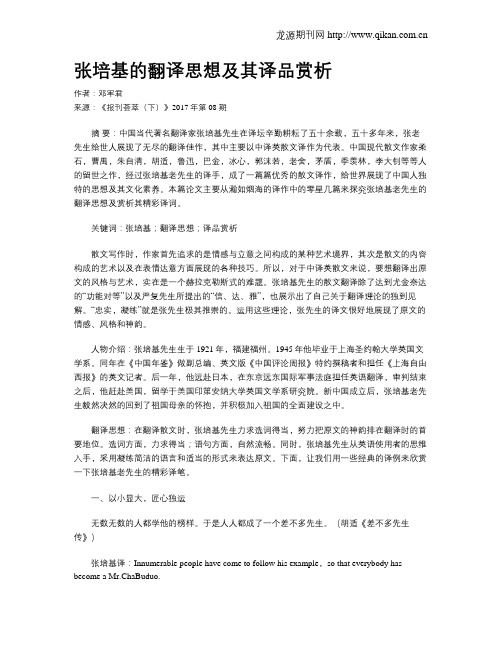
张培基的翻译思想及其译品赏析作者:邓军君来源:《报刊荟萃(下)》2017年第08期摘要:中国当代著名翻译家张培基先生在译坛辛勤耕耘了五十余载,五十多年来,张老先生给世人展现了无尽的翻译佳作,其中主要以中译英散文译作为代表。
中国现代散文作家柔石,曹禺,朱自清,胡适,鲁迅,巴金,冰心,郭沫若,老舍,茅盾,季羡林,李大钊等等人的留世之作,经过张培基老先生的译手,成了一篇篇优秀的散文译作,给世界展现了中国人独特的思想及其文化素养。
本篇论文主要从瀚如烟海的译作中的零星几篇来探究张培基老先生的翻译思想及赏析其精彩译词。
关键词:张培基;翻译思想;译品赏析散文写作时,作家首先追求的是情感与立意之间构成的某种艺术境界,其次是散文的内容构成的艺术以及在表情达意方面展现的各种技巧。
所以,对于中译英散文来说,要想翻译出原文的风格与艺术,实在是一个赫拉克勒斯式的难题。
张培基先生的散文翻译除了达到尤金奈达的“功能对等”以及严复先生所提出的“信、达、雅”,也展示出了自己关于翻译理论的独到见解。
“忠实,凝练”就是张先生极其推崇的。
运用这些理论,张先生的译文很好地展现了原文的情感、风格和神韵。
人物介绍:张培基先生生于1921年,福建福州。
1945年他毕业于上海圣约翰大学英国文学系。
同年在《中国年鉴》做副总编、英文版《中国评论周报》特约撰稿者和担任《上海自由西报》的英文记者。
后一年,他远赴日本,在东京远东国际军事法庭担任英语翻译,审判结束之后,他赶赴美国,留学于美国印第安纳大学英国文学系研究院。
新中国成立后,张培基老先生毅然决然的回到了祖国母亲的怀抱,并积极加入祖国的全面建设之中。
翻译思想:在翻译散文时,张培基先生力求选词得当,努力把原文的神韵排在翻译时的首要地位。
选词方面,力求得当;语句方面,自然流畅。
同时,张培基先生从英语使用者的思维入手,采用凝练简洁的语言和适当的形式来表达原文。
下面,让我们用一些经典的译例来欣赏一下张培基老先生的精彩译笔。
张培基翻译思想的生态翻译学诠释

张培基翻译思想的生态翻译学诠释
张培基(Paul Ricoeur)的翻译思想是生态翻译学诠释,该思想认为翻
译过程是一个复杂多变的活动,既包括翻译双方语言文化,也包括两
种文化风格及语言系统之间的相互关系。
这种“生态”的翻译理念,把
翻译当作一种“语言界的活动”来看待,而不仅仅是一种文本移植的活动,可以将原语文本与译文弥补得更加完美。
在张培基的翻译理论中,他主张探究翻译的过程学习不同的文化系统。
他提出,翻译是一种对他人文化的思考过程,而不是仅仅离散的文化
交流行为,让两种不同文化之间有一个统一的心理范式和理念,以便
融入原语文本的翻译理念及其核心信息。
张培基的生态翻译学诠释也强调翻译者在翻译过程中应该灵活调整调
节原语文本中的信息,以适应其他文化中特定的心理范式,以便正确
传达原语中的信息。
翻译目的论视角下张培基英译文赏析以《我坐了木船》为例
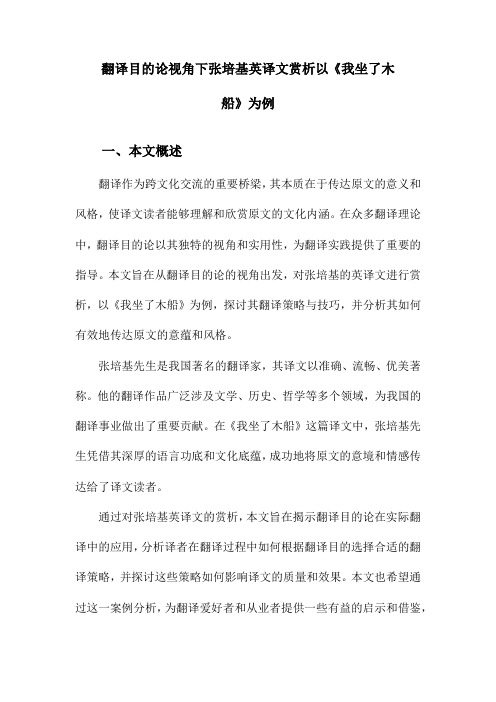
翻译目的论视角下张培基英译文赏析以《我坐了木船》为例一、本文概述翻译作为跨文化交流的重要桥梁,其本质在于传达原文的意义和风格,使译文读者能够理解和欣赏原文的文化内涵。
在众多翻译理论中,翻译目的论以其独特的视角和实用性,为翻译实践提供了重要的指导。
本文旨在从翻译目的论的视角出发,对张培基的英译文进行赏析,以《我坐了木船》为例,探讨其翻译策略与技巧,并分析其如何有效地传达原文的意蕴和风格。
张培基先生是我国著名的翻译家,其译文以准确、流畅、优美著称。
他的翻译作品广泛涉及文学、历史、哲学等多个领域,为我国的翻译事业做出了重要贡献。
在《我坐了木船》这篇译文中,张培基先生凭借其深厚的语言功底和文化底蕴,成功地将原文的意境和情感传达给了译文读者。
通过对张培基英译文的赏析,本文旨在揭示翻译目的论在实际翻译中的应用,分析译者在翻译过程中如何根据翻译目的选择合适的翻译策略,并探讨这些策略如何影响译文的质量和效果。
本文也希望通过这一案例分析,为翻译爱好者和从业者提供一些有益的启示和借鉴,推动翻译研究的深入发展。
二、翻译目的论框架下的翻译原则与策略翻译目的论,作为一种功能主义的翻译理论,强调翻译的目的和翻译行为所要达到的功能。
在此理论框架下,翻译的原则和策略都围绕翻译的目的进行选择和调整。
在翻译目的论的指导下,翻译的首要原则是目的性原则,即翻译行为应满足译文的预期功能或目的。
这一原则要求译者在翻译过程中,不仅要忠实于原文的内容,更要考虑到译文的读者群体、文化背景和语境等因素,以确保译文能够有效地传达原文的意图和信息。
翻译目的论还强调连贯性原则和忠实性原则。
连贯性原则要求译文在内部逻辑和表达上要保持一致性和连贯性,使读者能够顺利理解译文。
忠实性原则则要求译文在尊重原文的基础上进行适当的调整,以确保译文与原文在意义和功能上的对等。
在翻译目的论的框架下,翻译策略的选择应服务于翻译的目的。
常见的翻译策略包括直译和意译。
直译策略更注重保留原文的字面意义和风格,而意译策略则更注重传达原文的深层含义和语境信息。
运用奈达和卡特福德的核心翻译理论来分析张培基的译作《背影》
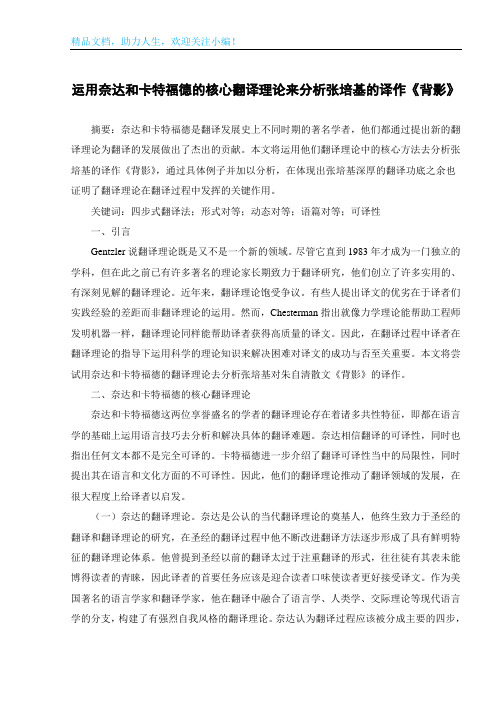
运用奈达和卡特福德的核心翻译理论来分析张培基的译作《背影》摘要:奈达和卡特福德是翻译发展史上不同时期的著名学者,他们都通过提出新的翻译理论为翻译的发展做出了杰出的贡献。
本文将运用他们翻译理论中的核心方法去分析张培基的译作《背影》,通过具体例子并加以分析,在体现出张培基深厚的翻译功底之余也证明了翻译理论在翻译过程中发挥的关键作用。
关键词:四步式翻译法;形式对等;动态对等;语篇对等;可译性一、引言Gentzler说翻译理论既是又不是一个新的领域。
尽管它直到1983年才成为一门独立的学科,但在此之前已有许多著名的理论家长期致力于翻译研究,他们创立了许多实用的、有深刻见解的翻译理论。
近年来,翻译理论饱受争议。
有些人提出译文的优劣在于译者们实践经验的差距而非翻译理论的运用。
然而,Chesterman指出就像力学理论能帮助工程师发明机器一样,翻译理论同样能帮助译者获得高质量的译文。
因此,在翻译过程中译者在翻译理论的指导下运用科学的理论知识来解决困难对译文的成功与否至关重要。
本文将尝试用奈达和卡特福德的翻译理论去分析张培基对朱自清散文《背影》的译作。
二、奈达和卡特福德的核心翻译理论奈达和卡特福德这两位享誉盛名的学者的翻译理论存在着诸多共性特征,即都在语言学的基础上运用语言技巧去分析和解决具体的翻译难题。
奈达相信翻译的可译性,同时也指出任何文本都不是完全可译的。
卡特福德进一步介绍了翻译可译性当中的局限性,同时提出其在语言和文化方面的不可译性。
因此,他们的翻译理论推动了翻译领域的发展,在很大程度上给译者以启发。
(一)奈达的翻译理论。
奈达是公认的当代翻译理论的奠基人,他终生致力于圣经的翻译和翻译理论的研究,在圣经的翻译过程中他不断改进翻译方法逐步形成了具有鲜明特征的翻译理论体系。
他曾提到圣经以前的翻译太过于注重翻译的形式,往往徒有其表未能博得读者的青睐,因此译者的首要任务应该是迎合读者口味使读者更好接受译文。
作为美国著名的语言学家和翻译学家,他在翻译中融合了语言学、人类学、交际理论等现代语言学的分支,构建了有强烈自我风格的翻译理论。
张培基英汉翻译教程

张培基英汉翻译教程张培基英汉翻译教程1. 引言•介绍张培基及其英汉翻译教程的背景和目的。
2. 基本概念•什么是英汉翻译?•英汉翻译的重要性•英汉翻译的难点和挑战•张培基的翻译理论和方法论3. 翻译准备•翻译前的背景研究•翻译所需的工具和资源•翻译的时间管理和计划4. 翻译步骤•理解原文•确定翻译目标和风格•转换句子结构和语序•翻译技巧和策略•校对和修改翻译稿5. 翻译质量控制•校对和修改的重要性•常见翻译错误及修改建议•翻译评估和反馈6. 结语•总结张培基英汉翻译教程的要点和价值。
注:此为模拟回答,实际的详细教程需要根据张培基英汉翻译教程的内容进行整理。
张培基英汉翻译教程1. 引言张培基英汉翻译教程是一份由资深创作者张培基撰写的教程,旨在帮助学习者掌握英汉翻译的技巧和方法。
本教程整理了张培基关于英汉翻译的理论和实践经验,并提供了详细的翻译步骤和质量控制方法。
2. 基本概念•英汉翻译:解释英语文本,并将其转化为中文的过程。
•英汉翻译的重要性:英汉翻译在国际交流和跨文化交流中起着重要的作用。
•英汉翻译的难点和挑战:涉及文化差异、语言特点以及专业术语等方面的挑战。
•张培基的翻译理论和方法论:介绍张培基对翻译的理解和他独特的翻译方法。
3. 翻译准备•翻译前的背景研究:了解原文的主题、背景信息以及作者的写作意图。
•翻译所需的工具和资源:介绍常用的翻译工具,如电子词典、翻译记忆软件等。
•翻译的时间管理和计划:合理安排翻译的时间,提高工作效率。
4. 翻译步骤•理解原文:通过仔细阅读原文,确保对其含义和表达方式有全面的理解。
•确定翻译目标和风格:根据翻译的用途和目标受众,确定翻译的风格和方向。
•转换句子结构和语序:根据中文的语法和表达习惯,重新组织和调整句子结构和语序。
•翻译技巧和策略:介绍一些翻译中常用的技巧和策略,如同义替换、意译和增译等。
•校对和修改翻译稿:对翻译的稿件进行仔细校对和修改,确保准确无误。
5. 翻译质量控制•校对和修改的重要性:强调对翻译稿的反复校对和修改,以保证翻译质量。
汉英翻译中比喻的翻译研究——以张培基《英译中国现代散文选》为例
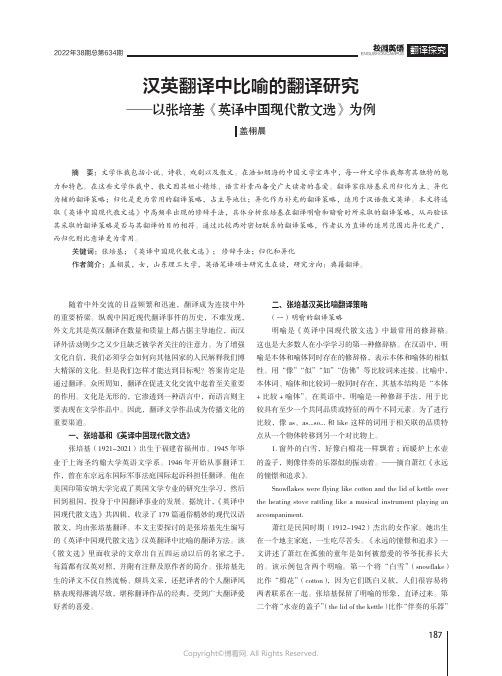
ENGLISH ON CAMPUS2022年38期总第634期汉英翻译中比喻的翻译研究——以张培基《英译中国现代散文选》为例摘 要:文学体裁包括小说、诗歌、戏剧以及散文。
在浩如烟海的中国文学宝库中,每一种文学体裁都有其独特的魅力和特色。
在这些文学体裁中,散文因其短小精炼、语言朴素而备受广大读者的喜爱。
翻译家张培基采用归化为主、异化为辅的翻译策略;归化是更为常用的翻译策略,占主导地位;异化作为补充的翻译策略,适用于汉语散文英译。
本文将选取《英译中国现代散文选》中高频率出现的修辞手法,具体分析张培基在翻译明喻和暗喻时所采取的翻译策略,从而验证其采取的翻译策略是否与其翻译的目的相符。
通过比较两对密切联系的翻译策略,作者认为直译的适用范围比异化更广,而归化则比意译更为常用。
关键词:张培基;《英译中国现代散文选》; 修辞手法;归化和异化作者简介:盖栩晨,女,山东理工大学,英语笔译硕士研究生在读,研究方向:典籍翻译。
随着中外交流的日益频繁和迅速,翻译成为连接中外的重要桥梁。
纵观中国近现代翻译事件的历史,不难发现,外文尤其是英汉翻译在数量和质量上都占据主导地位,而汉译外活动则少之又少且缺乏被学者关注的注意力。
为了增强文化自信,我们必须学会如何向其他国家的人民解释我们博大精深的文化。
但是我们怎样才能达到目标呢?答案肯定是通过翻译。
众所周知,翻译在促进文化交流中起着至关重要的作用。
文化是无形的,它渗透到一种语言中,而语言则主要表现在文学作品中。
因此,翻译文学作品成为传播文化的重要渠道。
一、张培基和《英译中国现代散文选》张培基(1921-2021)出生于福建省福州市。
1945年毕业于上海圣约翰大学英语文学系。
1946年开始从事翻译工作,曾在东京远东国际军事法庭国际起诉科担任翻译。
他在美国印第安纳大学完成了英国文学专业的研究生学习,然后回到祖国,投身于中国翻译事业的发展。
据统计,《英译中国现代散文选》共四辑,收录了179篇通俗精妙的现代汉语散文,均由张培基翻译。
张培基《英译中国现代散文选》中修辞手法的翻译策略研究

张培基《英译中国现代散文选》中修辞手法的翻译策略研究英译中国现代散文选是张培基的一部经典著作。
文中阐述了英翻中的一些关键策略,并且在涉及到修辞手法的翻译上,提出了诸多有效的翻译方法。
首先,张培基提到了修辞手法对翻译影响。
中国现代散文选中,大量修辞手法被用来加强文字的表达效果,这些修辞手法在英文中未必能得到完美的体现。
因此,翻译时,译者要力求完整地保留原文的修辞效果,以减少原文的形式和内容上的差异。
其次,张培基也强调在修辞手法的翻译过程中,要做到多事、多方,即既要充分表达原作意涵,又要尊重原作特色。
只有结合当时的情景等背景信息,在保留原作风格和氛围的同时,才能增加英文译文词汇和表达方式的多样性。
此外,为了实现更好的效果,张培基强调翻译者多熟悉一段时期的原文精神,弄清一种文字所具有的特定风格,以及该风格下修辞手法的施用方法和律动。
只有熟悉这些,才可以在完全表达原文韵律和修辞效果的同时,进行更自然的翻译,更好地表现中国的美学特色。
最后,张培基提出,翻译时对修辞手法的把握要体现和表达原文的情调,积极把握一定的修辞效果,以使英文译文更加得体、雅致,凝练、质朴。
总而言之,英译中文现代散文要求翻译者无论在表达方面还是语言工具方面,都具有非凡的天赋和高超的技能,使得英文译文精妙绝伦,信达雅。
张培基提出的修辞手法的翻译策略,不仅丰富了翻译的技巧,也为英译中文现代散文的翻译发展提供了可贵的启示。
Zhang Peiji's English Translation of Chinese Modern Prose Selections is a classic work. The book discloses some key strategies for English translation into Chinese, and also provides numerous effective methods for the translation of rhetorical techniques.Firstly, Zhang Peiji pointed out the influence of rhetorical techniques on translation. In Chinese Modern Prose Selections, numerous rhetorical techniques are used to improve the expressiveness of the words, which may not be perfectly expressed in English. Therefore, when translating, the translator should try to preserve the original rhetorical effect completely to reduce the difference in form and content of the original text.Secondly, Zhang Peiji also emphasized the need to be versatile and multi-talented when translating rhetorical techniques, that is, to fully express the original intention of the work and respect its characteristics. Only by combining the background information such as the original context, can the diversity of English vocabulary and expression be increased while retaining the style and atmosphere of the original work.In addition, in order to achieve better results, Zhang Peiji stressed that the translator should be familiar with the spirit of the original text during a certain period, understand the specific style of a text and the method and rhythm of using rhetorical techniques in this style. Only in this way can the original literary rhythm and rhetorical effects be fully expressed while the translator can perform a more natural translation and better demonstrate the aesthetic characteristics of China.Finally, Zhang Peiji suggested that when translating, the grasp of rhetorical techniques should reflect and express the mood of the original text, grasp certain rhetorical effects actively, so as to make English translation more decent, elegant, concise and unadorned.In conclusion, English translation of Chinese modern prose requires the translator to have extraordinary talents and superb skills both in expression and language tool, so that the English translation can be exquisite and tasteful. The translation strategies of rhetorical techniques proposed by Zhang Peiji not only enrich the translation skills, but also provide valuable inspiration for the development of English translation of Chinese modern prose.。
从《英译中国现代散文选》的译文看张培基的翻译理念

从《英译中国现代散文选》的译文看张培基的翻译理念作者:陈振云来源:《时代文学·下半月》2010年第10期一、引言张培基先生是我国著名的翻译家,他的散文翻译忠实、凝炼,在力求选词得当、语句自然流畅的同时又不拘泥于计较词句上的得失,而是把语篇神韵摆在第一位,追求既能完美地表达原文信息、原文功能、又能译出原文的风格与韵味,充分体现了他毕生追求的“忠实、通顺”的翻译理念。
他在《英译中国现代散文选》中的译作涵盖了五四运动以来相当一部分优秀的散文作品,不仅为中国学者深入研究翻译理论与技巧提供了典型实例文章,而且为外国学者研究中国五四以来知识分子的思想发展提供了大量的素材。
二、张培基“忠实通顺”的翻译理念及异曲同工的国外翻译理论张培基先生提出可用“忠实、通顺”四个字作为翻译标准。
忠实不但指忠实于原作的内容,还指保持原作的风格。
通顺指译文语言必须通顺易懂、流畅地道。
如果不考虑表达是否通顺,只注重内容的忠实,常会导致译文失去原作风采甚至使读者看不懂;另一方面,如果牺牲内容而追求表达方式的华丽,则无法传达原文信息。
二者都不能说是完美的翻译。
在不能兼而有之的情况下,译者应首先照顾忠实的要求。
国内外持这种观点的大有人在,例如,德国翻译的“科学论”者赖斯在与弗米尔合作的《翻译理论基本原理》一书中也同样强调译文与原文“意图”的一致性(即“忠实”)。
法国著名翻译理论家安帕罗·于塔多·阿尔比也提出:忠实的目标自然应该是翻译主体的意义。
他认为“在重新表达中的确存在着一定的自由度,但是要想忠实于意义,译者也必须服从重新表达这一层面所必须服从的某些限制,因为它只能使用那些可以清楚正确的为目的语读者表达同样意义的手段在”。
但是忠实是不容易做到的,对此,功能派的奠基性理论——翻译目的论的创立者弗米尔提出了三个法则:目的法则、连贯性法则和忠实性法则。
他强调从功能的动态性对等来解释翻译:翻译不是一种语言的词句到另一种语言的解码,而是一种非常复杂的行为方式:译者将原语文本的信息在新的、改变了功能、文化、语言的条件下复制,同时尽可能地保留原语的形式。
张培基汉译英技巧赏析

张培基汉译英技巧赏析张培基先生是目前我国翻译界领军人物之一。
本文试图根据张培基先生的译作从词义的选择与引申、对源语的理解与译文句式调整、直译与意译的结合和保持译文原貌与风格诸方面,欣赏和分析张先生的汉译英技巧,并对其所译的个别疏忽之处提出商榷。
标签:原语译语引申句式调整直译意译英语专业的学生对张培基先生的了解一般源于学习他和同仁所编的《英汉翻译教程》。
该教程不仅扼要介绍英译汉的理论知识,而且着重研究和探讨英译汉的具体方法和常用技巧,对研习英译汉的初学者有着现实的指导意义,体现了编者对英文语言特点和文体特征的透彻理解和高超的英译汉水平。
近年来,张培基先生对英译汉研究倾注大量心血,所译作品以翻译名家散文或杂文居多,并频频刊登在《英语世界》和《中国翻译》等期刊杂志上。
笔者篇篇拜读,不时为先生的择词、译出语构建和语段整合等技巧拍案叫绝,深为震撼,颇受教益。
本文试图通过剖析张培基先生所译作品的实例,欣赏和分析先生在翻译过程中所采用的汉英翻译技巧。
一、重视词义的选择与引申层次词义的选择是翻译的基本功,也是翻译理论的基本课题之一。
单词的涵义非常复杂,词典都尽量收集每一单词的各种涵义。
选择和确定词义是翻译过程中每位译者面临的难题,难怪严复曾有过“一名之立,旬月踟蹰”之感慨。
然而,张培基先生能深刻领悟原语的内涵,在汉译英时对英文词义反复推敲,挑选出最适合上下文语境的词汇。
原文:书房,是读书人心目中的一个私人领地,一个精神家园,一个智慧的世界。
到过几位朋友家的书房,尽管大小各不相同,陈设各异,但四壁书橱架上,层层叠叠的书籍,或排成整齐的行列,或纵横交错如阡陌丛林,满屋子到处是书,则大体相同。
新时期以来,各种多卷本全套硬面精装的文集,形形色色的选集,足以令书房生辉。
其间不乏名著佳作,可作为文化积累,但也难免混杂一些文化垃圾。
当然这些都无碍于书房主人坐拥书城之乐。
译文:The study is to a scholar his private domain, his spiritual home and his intellectual world. I’ve been to the studies of several friends. Though of different sizes and with different furnishings, they are never the less about the same in boasting a roomful of books. Books shelved in bookcases lining the four walls. Books either piled up one upon another, or displayed in neat rows, or laid out in disorder like fields with crisscross footpaths or a jungle. In recent years, the appearance of various multivolume collected works of every description has added to the splendor of a study. Among them there is no lack of great classics and master writings. On the other hand, some trash is inevitably mixed with them too. But that d oesn’’t hinder the owner of the study from enjoying the company of his library.源语为散文家何为于1999年6月所写的一篇佳作《书房》,选自他于2003年出版的散文集《近景与远景》。
翻译理论知识
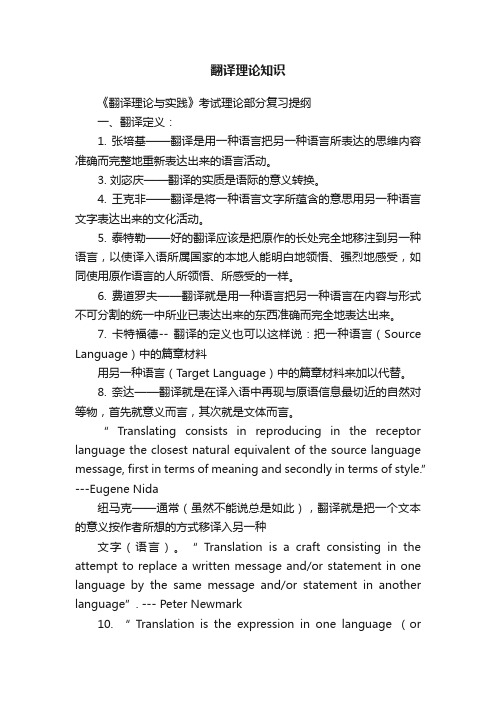
翻译理论知识《翻译理论与实践》考试理论部分复习提纲一、翻译定义:1. 张培基——翻译是用一种语言把另一种语言所表达的思维内容准确而完整地重新表达出来的语言活动。
3. 刘宓庆——翻译的实质是语际的意义转换。
4. 王克非——翻译是将一种语言文字所蕴含的意思用另一种语言文字表达出来的文化活动。
5. 泰特勒——好的翻译应该是把原作的长处完全地移注到另一种语言,以使译入语所属国家的本地人能明白地领悟、强烈地感受,如同使用原作语言的人所领悟、所感受的一样。
6. 费道罗夫——翻译就是用一种语言把另一种语言在内容与形式不可分割的统一中所业已表达出来的东西准确而完全地表达出来。
7. 卡特福德-- 翻译的定义也可以这样说:把一种语言(Source Language)中的篇章材料用另一种语言(Target Language)中的篇章材料来加以代替。
8. 奈达——翻译就是在译入语中再现与原语信息最切近的自然对等物,首先就意义而言,其次就是文体而言。
“ Translating consists in reproducing in the receptor language the closest natural equivalent of the source language message, first in terms of meaning and secondly in terms of style.” ---Eugene Nida纽马克——通常(虽然不能说总是如此),翻译就是把一个文本的意义按作者所想的方式移译入另一种文字(语言)。
“ Translation is a craft consisting in the attempt to replace a written message and/or statement in one language by the same message and/or statement in another language”. --- Peter Newmark10. “ Translation is the expression in one language (ortarget language 译入语) of what has been expressed in another language (source language 原语), preserving semantic and stylistic equivalences.” --- Dubois12. 13.Translation or translating is a communicative activity or dynamic process in which the translator makes great effort to thoroughly comprehend a written message or text in the source language and works very hard to achieve an adequate or an almost identical reproduction in the target language version of the written source language message or text.二、翻译标准1. 翻译的标准概括为言简意赅的四个字:“忠实(faithfulness)、通顺(smoothnesS”忠实指的是忠实于原文。
国内翻译家及学者对翻译的定义

风格和神韵。
完整地表达出来的语言活动。
另一种语言文字所表达的思想确切而完善地重新表达出来的实践。
得与原作相当的文献价值或文学价值。
技能。
使译入语所属国家的本地人能明白地领悟、强烈地感受,如同使用原作语言的人所领悟、所感受一样。
2费道罗夫认为,翻译就是用一种语言把另一种语言在内容与形式不可分割的统一中所业已表达出来的东西准确而完全地表达出来。
语言中的篇章材料用另一种语言中的篇章材料加以代替。
首先是就意义而言,其次是就文体而言。
是意义)不变的情况下改变为另外一种语言的言语产物的过程。
6纽马克认为,通常(虽然不能说总是如此)翻译就是把一个文本的意义按原作者所意想的方式移入另一种文字。
有单向性和不可逆性。
8国际译联主席安娜?利落娃认为,翻译作为一种过程,是一种口头和笔头活动,其目的在于把存在于一种语言的口说的或书面的话语(作品)用另一种语言再现出来,
的东西是什么,即信息,重在内容,其次是形式;第二、它表明语言文化上的差异决定着源语文本与译入语文本只能做到相对的对等,即“动态对等”(dynamic
equivalence);第三、考虑到了译文的可接受性。
张培基英汉翻译教程框架

英汉翻译教程—张培基编著上海外语教育出版社绪论翻译:是运用一种语言把另一种语言所表达的思维内容准确而完整地重新表达出来的语言活动。
第一章我国翻译史简介时间翻译活动备注西汉哀帝到中国口传一些简短的否经经句还谈不上佛经的翻译东汉恒帝建和二年始译《安般守意经》等30多部佛经安息(波斯)人支娄迦谶译10多部佛经译笔生硬读者不易看懂,直译意译出现支亮支谦译175部佛经主持设译场,《鞞婆沙》不懂梵文严格直译《金刚经》《法华经》《维摩经》《中观论》《十二门论》《百论》等三十余卷主张音译,倡译者署名,“天然西域之趣”南北朝《摄大乘论》等49部经论应梁武帝聘1.“诚心爱法,志愿益人,不惮久时”2.“襟抱平恕,器量虚融,不好专执”3.“耽于道术,谵于名利,不欲高炫”北宋派人西去求经,开封太平兴国寺内兴修了译经院南宋明清欧几里得的《几何原本》《测量法义》与利玛窦(意)合译《茶花女遗事》《黑奴吁天录》《块肉全生述》不懂外文,口述笔译,160多部文学作品《王子复仇记》《拟投翻译书院议》“善译”《马氏文通》作者赫胥黎《天演论》“信达雅”亚当斯密《原富》孟德斯鸠《法意》斯宾塞尔《群学肄言》《毁灭》《死魂灵》“一当然力求其易解,一则保存着原作的风姿”1.党领导下系统进行2.质量大大提高3.批评与自我批评4.外译汉,汉译外翻译标准日趋统一人物伊存安世高明代万历年间到清代“新学”时期严复苻秦鸠摩罗什玄奘古代翻译界巨星马建忠林纾过些时候(月支派)竺法护“三支”“既须求真,又须喻俗”即“忠实,通顺”印度求经、组织译场、梵汉(75部1334卷)、汉梵(老子著作的一部分)首向外介绍汉著新中国成立管主八公布查布徐光启梵文造诣深释道安真谛对待翻译工作严肃我五四近代翻译分水岭实叉难陀义净宋太祖拔合思巴智光鲁迅瞿秋白元不空隋到唐记载中见不到一部译经释彦琮第二章翻译的标准、过程以及对译作的要求第一节翻译的标准忠实:忠于原作内容、保持原作风格通顺:通顺易懂、符合规范语言现象(词汇含义、句法结构、惯用法)理解逻辑关系原文所涉及的事物第二节翻译的过程表达直译:保持内容、形式(比喻、形象等)意译:正确表达原文内容,不拘泥于形式人名、地名、日期、方位、数字段、句、重要的词校核错或不妥的词、句无生僻字、陈腔滥调、标点符号校核两遍:内容、润饰蚊子对照原文通读一遍第二节对翻译工作者的要求1.坚定的无产阶级立场和较高的马克思主义、毛泽东思想的理论水平2.努力提高本族语和外语的水平3.不断吸收和丰富各种基础知识,对有关国家的历史、地理、政治、外交、经济、文化、科学、风俗习惯等。
浅析张培基的翻译思想及其译品赏析

CAIXUN财讯-58- 浅析张培基的翻译思想及其译品赏析 □江西师范大学外国语学院 曾雅琳 / 文张培基先生是我国著名的翻译家、教育家。
在文学翻译特别是中国现代散文翻译方面具有高深造诣。
本文从张培基先生多年来翻译实践的结晶—《英译中国现代散文选》中挑选典型的译例从选材、翻译思想、翻译风格、散文翻译审美信息的传递进行了分析,最后对张培基的翻译观点和卓越贡献进行了归纳总结。
张培基 《英译中国现代散文选》 翻译思想 散文翻译的审美信息传递张培基,中国著名翻译家、教授。
作为翻译家,曾出版了许多翻译著作和译作,如:《习语汉译英研究》、《英语声色词与翻译》、《英汉翻译教程》等,他的译文自然流畅并且极具文采,令国内外学者及同行的受益匪浅。
吕叔湘先生说过:“一件事物的特点,要跟别的事物比较才显出来。
”张培基的译文充分体现了译者对中西两种文化、两种语言的透彻的理解和娴熟的驾驭。
他对中英两种语言有着深刻的理解和研究,特别能抓住两种语言的不同特点,充分掌握英汉词汇的差异。
翻译时张先生都能准确地做出相应转换。
以张培基的代表作《英译中国现代散文选》为研究对象,我们不难发现在在用词上不会用特别生僻的华丽的辞藻,相反,简单常用的词在译文中的频率相对较多的多。
1. 有的季节里,我上午读书下午种地,一到农忙便整月停在地里跟着母亲劳动。
这个时期母亲教给我许多生产知识。
译文:In some seasons, I would study in the morning and work in the fields in the afternoon. During the busy season, I would spend all day working by the side of mother. It was then that she taught me a lot about the knack of farming.朱德的《母亲的回忆》语言平实简约,却于平实中表达出作者对母亲深深的爱戴之情,在用词上都是选用最简单的词汇。
英汉翻译教程张培基【完整版】1

《英汉翻译教程》第一章 总论 翻译是运用一种语言把另一种语言所表达的思维内容准确完整地重新表达出来的语言翻译应当把原文的本意,完全正确的介绍给中国读者,使中国读者得到的概念等于英俄日德法等国的读奈达认为更准确地反映出好的翻译的实际过程是:(1)分析:从语法和语义两方面对原文的信息进行词层不对等的情况 词层不对等采取的策略 对等译法的实例 第二章 词语翻译 相关链接 family的------------------------2009年11月30日阅读 三、修辞引申 “言之无文,行之不远。
”为使译文增色,除了真实地再现原作中包含的内容外We should simplify procedures and take prompt action to import urgently needed technology ( Georges 是他的大臣Cardinal Georges )。
本例背景是美国前国务卿黑格辞职,而由 George Schu Despite their differences , their love will conquer. 尽管他们之间存在着分歧,他们的恋爱1.运用语境 这种手段主要用于语篇上找不到明显的衔接标记,但从意义上来讲是连贯统一的。
接表达出来的语言活动。
(张培基等 1983) 我国早期典籍《周礼·秋官司寇》篇里就有“象胥于英俄日德法等国的读者从原文得来的概念。
(瞿秋白:1931) “动态对等”(Dynamic Equivalence)是奈方面对原文的信息进行分析;(2)传译:译者在脑子里把经过分析的信息从原语转译成译语;(3)重新组织:把相关链接 family的译法: 原文:Do you have a family? 译文1:你有家庭吗? 译文2:你成家了吗? 辨析:现原作中包含的内容外,还得讲究修辞。
这样,在翻译时,往往因修辞需要而增添一些引申意义。
- 1、下载文档前请自行甄别文档内容的完整性,平台不提供额外的编辑、内容补充、找答案等附加服务。
- 2、"仅部分预览"的文档,不可在线预览部分如存在完整性等问题,可反馈申请退款(可完整预览的文档不适用该条件!)。
- 3、如文档侵犯您的权益,请联系客服反馈,我们会尽快为您处理(人工客服工作时间:9:00-18:30)。
The three religions and the nine schools of thought 三教九流; paper tiger 纸老虎; Breath one’s last---断气; go to one’s external rest---安息; the long sleep---长眠; see Marx 见马克思;
改为:他发现他们在向家庭主妇推销针线,锅罐,绸带,剪刀和钮扣。
Do you see any green in my eye? 你以为我是好欺骗的吗?
It is an order from President Bush/ I don’t care if it is from bush, tree, or grass.
If we don’t hang together, they shall hang us separately.
咱们要是不摽到一块儿,保准会吊到一块儿。我们不紧紧团结一致,必然一个个被人绞死。
我们必须共赴沙场,否则就得分赴刑场。
It is a truth universally acknowledged, that a single man in possession of a good fortune must be in want of a wife.
街道妇女应动员起来打扫卫生:Women in the street should be called on to do some cleaning.
“In the street” should be replaced by “in the community”.
她一大早起床,进城,见到了她的公爹:She got up early, went to the town and saw her public father. Public father should be father in law.
刘重德:信、达、切---faithfulness/expressiveness/closeness.
3.中国翻译史上的论争:
鲁迅:宁信而不顺---rather to be faithful than smooth。 目的:引入英文句式的表达法
梁实秋、赵景深:宁顺而不信---rather to be smooth than faithful 目的:可读性强,便于交流。
6.段落翻译练习:
沿着荷塘,是一条曲折的小煤屑路。这是一条幽僻的路;白天也少人走,夜晚更加寂寞。荷塘四面,长着许多树,蓊蓊郁郁的。路的一旁,是些杨柳,和一些不知道名字的树。没有月光的晚上,这路上阴森森的,有些怕人。今晚却很好,虽然月光也还是淡淡的。
Beside the lotus pond there is a small tortuous cinder path. This is a secluded road even by day, more isolated still at night. Around the pond, there are many trees rich in leaves, lush and green. There are some willows along the path, and some trees whose names I do not know. When there is no moonlight the road and pond have a haunted disconcerting feel to them. Tonight is not bad, even though the moon looks pale.
Spring up like mushrooms---雨后春笋
Everybody's business is nobody's business. 三个和尚无水喝
Among the blind the one -eyed man is king. 山中无老虎,猴子称霸王
然而,翻译负有文化交流的使命,即尽可能把一个民族的语言和文化习惯介绍给另一个民族。鲁迅先生就特别强调译文要“保留原文的丰姿”。 在南京大学姜秋霞教授举办的一次翻译调查中,多数读者认为,读异国文学是为了欣赏异国作品特有的韵味和语言风格,他们在读译文之前就已经对不同文化的差异有了一定的心理准备,有些人读译文的目的之一是想了解外国人与中国人之间的异同究竟在什么地方。因此,从促进世界文化交流这个角度上讲,我们在处理英译汉或汉译英时,都应着力于全面、完整地向译语读者介绍对方(己方)的全部意蕴,包括文化。特别要强调的是,在汉译英中,我们尤其要树立这种文化意识,积极创造条件,弘扬中华文化,帮助英语读者扩大加深对中华文化的了解。异化的翻译无疑在文化交流方面起了巨大的作用。
异化派代表人物韦努蒂(Lawrence Venuti ):
All roads lead to Rome: 条条大道通罗马 不能译成:殊途同归
To teach one’s grandmother to eat eggs: 教老祖母吃鸡蛋 不能译成:班门弄斧
班门弄斧:show off one’s proficiency with the axe before Lu Ban, the master carpenter.
Go west 上西天; go to heaven 上天堂; blow out the candles 吹灯拔蜡
kick the bucket 蹬腿: You can kick everything but you can not kick the bucket
直译不等于死译(dead translation):
傅雷:神似---spiritual conformity. Emphasizing the reproduction of the spirit of the flavor of the original.强调原作神韵再现。
钱钟书:化境---sublimed adaptation. Focus on the translator’s smooth and idiomatic Chinese version for the sake of the Chinese reader.
第一讲 翻译原则简介
一、教学目的:了解基本的翻译原则和翻译研究的问题
二、教学过程:
1.翻译的定义和内涵:(Definition and Connotation)
Translation is an art/ science/craft?
2. 中国几位翻译家的理论(influential translation principles):
意译的例子:It rains cats and dogs / at sixes and sevens /Adam’s apple
句子比较:Little fish does not eat big fish
直译:小鱼不吃大鱼 意译:胳膊拧不过大腿
试译:天有不测风云,人有旦夕祸福:
直译:Storms gather without warning in nature and bad luck befalls men overnight.
意译:The weather and human life are both unpredictable
有人说,翻译是带着镣铐跳舞(translation is like dancing in fetters);还有人说,翻译像女人,忠实的不漂亮,漂亮的不忠实。实际上,忠实与通顺的关系是辩证关系。
第二讲 翻译的过程
一、教学目的:怎样去理解和表达;学会表达的基本策略。
二、教学过程:
1.理解与表达:
He found them pushing needles, thread, pots, pans, ribbons, yarns, scissors and buttons to house wives.他发现他们在向家庭主妇推销针头线脑,锅碗瓢盆。 (国外没有瓢)
“Translation should arouse the same feeling in its receptors as the feeling of the readers of the original”---- Nida
For instance: as white as snow 通常译为白如雪 / 但没有见过雪的人可以将其翻译为“白如白鹭毛”,以达到功能对等的目的。
归化派代表人物尤金•奈达(Eugene A. Nida): Functional Equivalence 功能对等
What is functional equivalence?
“The receptors of the translated text could respond to it with comprehension and appreciation in essentially the same manner and to the same degree as the original receptors of the message”;
严复:信达雅--- faithfulness/expressiveness/elegance. The “three character guide” is regarded as a plumb-line of long standing to measure the professional level of translating.
Hence:
Make hay while it is sunshine: 不能译成:趁热打铁
If I slapped someone, He would see the way to Cracow: 要是我给谁一巴掌,准会把他扇到克拉科去。不能:一巴掌扇到西天去。
